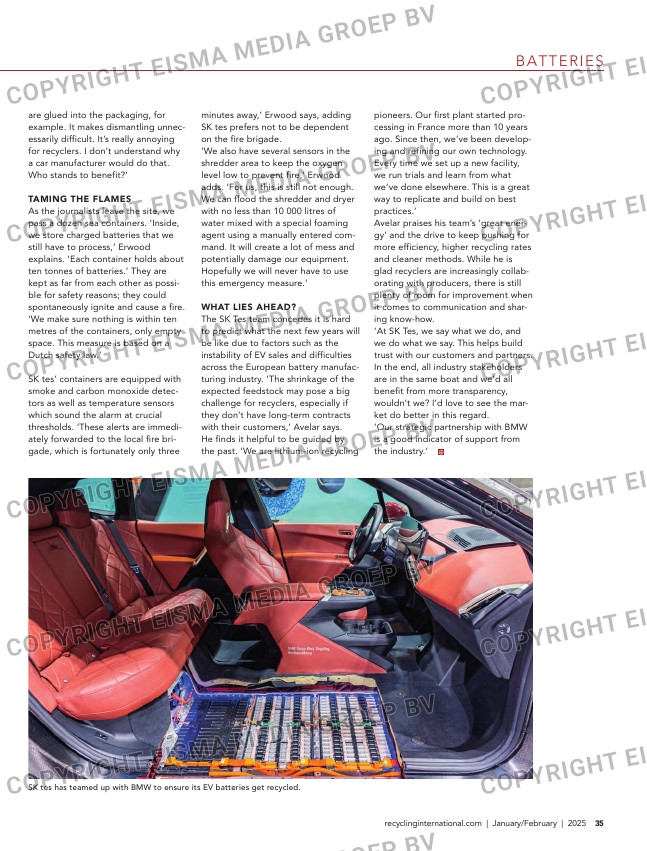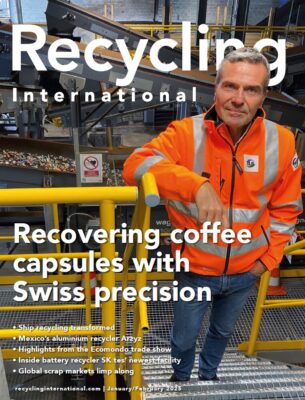Page 35 from: Recycling International Jan/Feb 2025

BATTERIES
35recyclinginternational.com | January/February | 2025
are glued into the packaging, for
example. It makes dismantling unnec-
essarily difficult. It’s really annoying
for recyclers. I don’t understand why
a car manufacturer would do that.
Who stands to benefit?’
TAMING THE FLAMES
As the journalists leave the site, we
pass a dozen sea containers. ‘Inside,
we store charged batteries that we
still have to process,’ Erwood
explains. ‘Each container holds about
ten tonnes of batteries.’ They are
kept as far from each other as possi-
ble for safety reasons; they could
spontaneously ignite and cause a fire.
‘We make sure nothing is within ten
metres of the containers, only empty
space. This measure is based on a
Dutch safety law.’
SK tes’ containers are equipped with
smoke and carbon monoxide detec-
tors as well as temperature sensors
which sound the alarm at crucial
thresholds. ‘These alerts are immedi-
ately forwarded to the local fire bri-
gade, which is fortunately only three
minutes away,’ Erwood says, adding
SK tes prefers not to be dependent
on the fire brigade.
‘We also have several sensors in the
shredder area to keep the oxygen
level low to prevent fire,’ Erwood
adds. ‘For us, this is still not enough.
We can flood the shredder and dryer
with no less than 10 000 litres of
water mixed with a special foaming
agent using a manually entered com-
mand. It will create a lot of mess and
potentially damage our equipment.
Hopefully we will never have to use
this emergency measure.’
WHAT LIES AHEAD?
The SK Tes team concedes it is hard
to predict what the next few years will
be like due to factors such as the
instability of EV sales and difficulties
across the European battery manufac-
turing industry. ‘The shrinkage of the
expected feedstock may pose a big
challenge for recyclers, especially if
they don’t have long-term contracts
with their customers,’ Avelar says.
He finds it helpful to be guided by
the past. ‘We are lithium-ion recycling
pioneers. Our first plant started pro-
cessing in France more than 10 years
ago. Since then, we’ve been develop-
ing and refining our own technology.
Every time we set up a new facility,
we run trials and learn from what
we’ve done elsewhere. This is a great
way to replicate and build on best
practices.’
Avelar praises his team’s ‘great ener-
gy’ and the drive to keep pushing for
more efficiency, higher recycling rates
and cleaner methods. While he is
glad recyclers are increasingly collab-
orating with producers, there is still
plenty of room for improvement when
it comes to communication and shar-
ing know-how.
‘At SK Tes, we say what we do, and
we do what we say. This helps build
trust with our customers and partners.
In the end, all industry stakeholders
are in the same boat and we’d all
benefit from more transparency,
wouldn’t we? I’d love to see the mar-
ket do better in this regard.
‘Our strategic partnership with BMW
is a good indicator of support from
the industry.’
THE RIGHT BATTERIES
The SK tes crew accepts complete
battery packs, which can contain ten
or more modules, as well as individual
cells. For now, the recycler is focusing
on those from passenger vehicles.
Larger batteries from buses and trains
would be a logical next step.
‘We can handle almost any brand, it
really doesn’t matter which company
produces them,’ says Nils
Steinbrecher, md at Tes Sustainable
Battery Solutions. He believes success
depends on close co-operation. ‘We
get samples from car manufacturers,
so our team knows what they can
expect in the coming years.’
The batteries first pass through the
hands of the R&D specialists, who are
trained to recognise different battery
types, components and design princi-
ples. ‘They enter the new data into
our detailed database. So far, every
type of car battery has been gone
through our process but, sometimes,
it takes a little more effort.’
Steinbrecher acknowledges that some
car batteries are more sustainable
than others. ‘Take those batteries that
The SK tes crew can recognise many different battery types, components and design principles. SK tes has teamed up with BMW to ensure its EV batteries get recycled.
32-33-34-35_sktes.indd 35 29-01-2025 11:27



